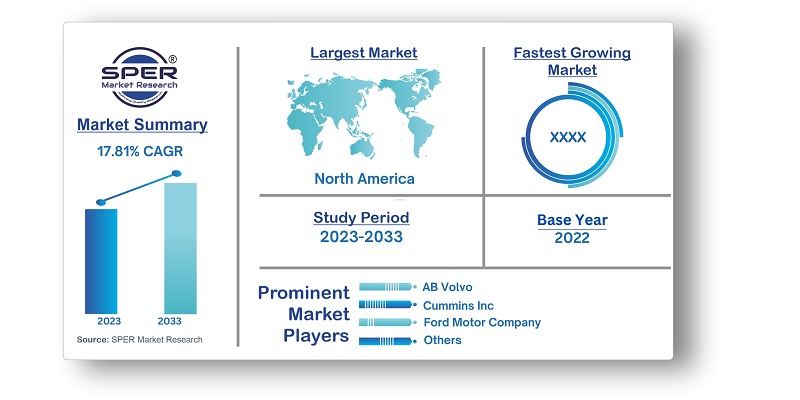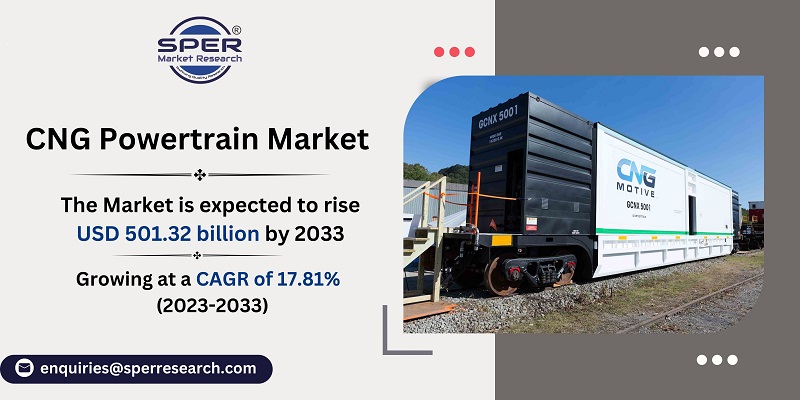
CNG Powertrain Market Growth, Size, Trends, Demand, Revenue, Challenges and Future Outlook
CNG Powertrain Market Size- By Drive Type, By Fuel Type, By Vehicle Type- Regional Outlook, Competitive Strategies and Segment Forecast to 2033
| Published: Sep-2023 | Report ID: AMIN23142 | Pages: 1 - 224 | Formats*: |
| Category : Automotive & Transportation | |||
- January 2023: Two CNG powertrain options were introduced by Maruti Suzuki for the Grand Vitara SUV.
- June 2023: Due to the drop in CNG's pricing, Tata Motors increases its manufacturing of CNG-based models.


| Report Metric | Details |
| Market size available for years | 2019-2033 |
| Base year considered | 2022 |
| Forecast period | 2023-2033 |
| Segments covered | By Drive Type, By Fuel Type, By Vehicle Type |
| Regions covered | North America, Asia-Pacific, Latin America, Middle East & Africa and Europe |
| Companies Covered | AB Volvo, Cummins Inc., Ford Motor Company, FPT Industrial S.P.A., Honda Motor Company, Hyundai Motor Company, Maruti Suzuki India Limited, Nissan Motor Co., Ltd., Robert Bosch GmbH., Volkswagen AG, Others |
- Commercial Trucking Companies
- Energy and Sustainability Managers
- Fleet Owners and Operators
- Fueling Station Developers
- Municipalities and Government Agencies
- Natural Gas Suppliers
- Taxi and Ride-Sharing Services
- Vehicle Manufacturers
- Others
| By Drive Type: |
|
| By Fuel Type: |
|
| By Vehicle Type: |
|
- Global CNG Powertrain Market Size (FY’2023-FY’2033)
- Overview of Global CNG Powertrain Market
- Segmentation of Global CNG Powertrain Market By Drive Type (All-Wheel Drive, Front Wheel Drive, Rear Wheel Drive)
- Segmentation of Global CNG Powertrain Market By Fuel Type (Bi-fuel, Mono Fuel)
- Segmentation of Global CNG Powertrain Market By Vehicle Type (Commercial Vehicle, Passenger Vehicle)
- Statistical Snap of Global CNG Powertrain Market
- Expansion Analysis of Global CNG Powertrain Market
- Problems and Obstacles in Global CNG Powertrain Market
- Competitive Landscape in the Global CNG Powertrain Market
- Impact of COVID-19 and Demonetization on Global CNG Powertrain Market
- Details on Current Investment in Global CNG Powertrain Market
- Competitive Analysis of Global CNG Powertrain Market
- Prominent Players in the Global CNG Powertrain Market
- SWOT Analysis of Global CNG Powertrain Market
- Global CNG Powertrain Market Future Outlook and Projections (FY’2023-FY’2033)
- Recommendations from Analyst
1.1. Scope of the report1.2. Market segment analysis
2.1. Research data source2.1.1. Secondary Data2.1.2. Primary Data2.1.3. SPER’s internal database2.1.4. Premium insight from KOL’s2.2. Market size estimation2.2.1. Top-down and Bottom-up approach2.3. Data triangulation
4.1. Driver, Restraint, Opportunity and Challenges analysis4.1.1. Drivers4.1.2. Restraints4.1.3. Opportunities4.1.4. Challenges4.2. COVID-19 Impacts of the Global CNG Powertrain Market
5.1. SWOT Analysis5.1.1. Strengths5.1.2. Weaknesses5.1.3. Opportunities5.1.4. Threats5.2. PESTEL Analysis5.2.1. Political Landscape5.2.2. Economic Landscape5.2.3. Social Landscape5.2.4. Technological Landscape5.2.5. Environmental Landscape5.2.6. Legal Landscape5.3. PORTER’s Five Forces5.3.1. Bargaining power of suppliers5.3.2. Bargaining power of buyers5.3.3. Threat of Substitute5.3.4. Threat of new entrant5.3.5. Competitive rivalry5.4. Heat Map Analysis
6.1. Global CNG Powertrain Market Manufacturing Base Distribution, Sales Area, Product Type6.2. Mergers & Acquisitions, Partnerships, Product Launch, and Collaboration in Global CNG Powertrain Market
7.1. Global CNG Powertrain Market Value Share and Forecast, By Drive Type, 2023-20337.2. All-Wheel Drive7.3. Front Wheel Drive7.4. Rear Wheel Drive
8.1. Global CNG Powertrain Market Value Share and Forecast, By Fuel Type, 2023-20338.2. Bi-fuel8.3. Mono Fuel
9.1. Global CNG Powertrain Market Value Share and Forecast, By Vehicle Type, 2023-20339.2. Commercial Vehicle9.3. Passenger Vehicle
10.1. Global CNG Powertrain Market Size and Market Share
11.1. Global CNG Powertrain Market Size and Market Share By Drive Type (2019-2026)11.2. Global CNG Powertrain Market Size and Market Share By Drive Type (2027-2033)
12.1. Global CNG Powertrain Market Size and Market Share By Fuel Type (2019-2026)12.2. Global CNG Powertrain Market Size and Market Share By Fuel Type (2027-2033)
13.1. Global CNG Powertrain Market Size and Market Share By Vehicle Type (2019-2026)13.2. Global CNG Powertrain Market Size and Market Share By Vehicle Type (2027-2033)
14.1. Global CNG Powertrain Market Size and Market Share By Region (2019-2026)14.2. Global CNG Powertrain Market Size and Market Share By Region (2027-2033)14.3. Asia-Pacific14.3.1. Australia14.3.2. China14.3.3. India14.3.4. Japan14.3.5. South Korea14.3.6. Rest of Asia-Pacific14.4. Europe14.4.1. France14.4.2. Germany14.4.3. Italy14.4.4. Spain14.4.5. United Kingdom14.4.6. Rest of Europe14.5. Middle East and Africa14.5.1. Kingdom of Saudi Arabia14.5.2. United Arab Emirates14.5.3. Rest of Middle East & Africa14.6. North America14.6.1. Canada14.6.2. Mexico14.6.3. United States14.7. Latin America14.7.1. Argentina14.7.2. Brazil14.7.3. Rest of Latin America
15.1. AB Volvo15.1.1. Company details15.1.2. Financial outlook15.1.3. Product summary15.1.4. Recent developments15.2. Cummins Inc.15.2.1. Company details15.2.2. Financial outlook15.2.3. Product summary15.2.4. Recent developments15.3. Ford Motor Company15.3.1. Company details15.3.2. Financial outlook15.3.3. Product summary15.3.4. Recent developments15.4. FPT Industrial S.P.A.15.4.1. Company details15.4.2. Financial outlook15.4.3. Product summary15.4.4. Recent developments15.5. Honda Motor Company15.5.1. Company details15.5.2. Financial outlook15.5.3. Product summary15.5.4. Recent developments15.6. Hyundai Motor Company15.6.1. Company details15.6.2. Financial outlook15.6.3. Product summary15.6.4. Recent developments15.7. Maruti Suzuki India Limited15.7.1. Company details15.7.2. Financial outlook15.7.3. Product summary15.7.4. Recent developments15.8. Nissan Motor Co., Ltd.15.8.1. Company details15.8.2. Financial outlook15.8.3. Product summary15.8.4. Recent developments15.9. Robert Bosch GmbH15.9.1. Company details15.9.2. Financial outlook15.9.3. Product summary15.9.4. Recent developments15.10. Volkswagen AG15.10.1. Company details15.10.2. Financial outlook15.10.3. Product summary15.10.4. Recent developments15.11. Others
SPER Market Research’s methodology uses great emphasis on primary research to ensure that the market intelligence insights are up to date, reliable and accurate. Primary interviews are done with players involved in each phase of a supply chain to analyze the market forecasting. The secondary research method is used to help you fully understand how the future markets and the spending patterns look likes.
The report is based on in-depth qualitative and quantitative analysis of the Product Market. The quantitative analysis involves the application of various projection and sampling techniques. The qualitative analysis involves primary interviews, surveys, and vendor briefings. The data gathered as a result of these processes are validated through experts opinion. Our research methodology entails an ideal mixture of primary and secondary initiatives.



Frequently Asked Questions About This Report
PLACE AN ORDER
Year End Discount
Sample Report
Pre-Purchase Inquiry
NEED CUSTOMIZATION?
Request CustomizationCALL OR EMAIL US
100% Secure Payment






Related Reports
Our Global Clients
Our data-driven insights have influenced the strategy of 200+ reputed companies across the globe.




















